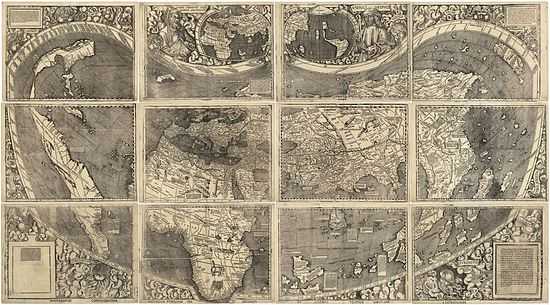Richard Amerike
Richard ap Meryk, Anglicised to Richard Amerike (or Ameryk) (c. 1445–1503) was a wealthy Anglo-Welsh merchant, royal customs officer and sheriff of Bristol.[1] He was the principal owner of the Matthew, the ship sailed by John Cabot during his voyage of exploration to North America in 1497.[1] A Bristolian scholar and amateur historian, Alfred Hudd, suggested in 1908 that the continental name America was derived from Amerike's surname due to his sponsorship of Cabot's expedition to Newfoundland and was used on early British maps that have since been lost. However, the consensus view is that America is named after Amerigo Vespucci, the Italian explorer.
Biography
Richard Amerike was born in 1445 at Meryk Court, Weston under Penyard, near Ross-on-Wye, Herefordshire, a descendant of the Earls of Gwent. The family name was an anglicised spelling of the Welsh ap Meuric, ap Meurig or ap Meryk, which means "son of Meurig".[1]
Amerike married Lucy Wells and settled for a time at West Camel, near Ilchester in Somerset. He decided to move his family to Bristol, a city growing in importance as a port, and second only to London at the time. It was attracting merchants and adventurers from all over the country. Amerike became a wealthy and important merchant and dignitary, holding the post of King's Customs Officer three times and becoming the High Sheriff of Bristol in 1497.
Seeking new sources of fish and other resources, Amerike and other Bristol merchants helped fund an expedition beyond Iceland authorised by the king. The Italian Giovanni Caboto (called John Cabot) was to lead the voyage. Amerike was said to be a major sponsor, as well as donating logs from his estate to build the ship Matthew for the expedition. Because Amerike's coat of arms was similar to the flag later adopted by the independent United States, a legend grew that the North American continent had been named for him rather than for Amerigo Vespucci.[1] It is not widely accepted.
Theory of the naming of America
In 1908, the local Bristol antiquarian Alfred Hudd first proposed the theory that the word America had evolved from Amerike or ap Meryk, based on a lost manuscript that he claimed to have seen.

Hudd proposed that the word "America" was originally applied to a destination across the western ocean, possibly an island or a fishing station in Newfoundland. After the king of Iceland had cut off trade for fish, England sent out expeditions to find new sources. Hudd suggested Amerike's sponsorship made his name known in Bristol in association with the North American destinations prior to other mapmaking or voyages. The writer Jonathan Cohen noted he made a conjectural leap to reach that conclusion, and no extant evidence supports it.[2] In 2001, scholar John Davies briefly mentioned the story as a kind of Welsh patriot piece.[3]
John Lloyd and John Mitchinson, authors of "The Book of General Ignorance" (2006) explained that John Cabot mapped the coastline of "America" from Nova Scotia to Newfoundland in 1497, a decade before Waldseemüller's world map appeared in 1507 and five years before Amerigo Vespucci set out with Christopher Columbus. Lloyd and Mitchinson wrote, "As the chief patron of the voyage, Richard Ameryk would have expected discoveries to be named after him. There is a record in the Bristol calendar for that year: '... on Saint John the Baptist's day [June 24], the land of America was found by the merchants of Bristowe, in a ship of Bristowe called the Mathew." (p. 94) However, neither authors cite the source of their material that claims "America" was first named by Cabot after his patron.
The traditionally accepted person attributed to the naming is cartographer Martin Waldseemüller, who used the Latinized feminine form of Amerigo Vespucci's first name, "America", on his world map of 1507, which has survived the centuries. However, Jules Marcou, a prominent French geologist who while studying North America argued, as did other 19th-century writers, that Vespucci changed his Christian name from Alberico to Amerigo after his discovery. Indeed, the only records of Vespucci's full name were created a few years before his death, long after his voyage. Specifically, Marcou introduced the name of an Indian tribe and of a district in Nicaragua called Amerrique (Land of the Wind), visited by both Columbus and Vespucci. The region was rich in gold, which led to Amerrique and gold becoming synonymous with the explorers. Vespucci may have been bequeathed with the nickname by others, or invented it himself; either way, he signed two documents using "Amerigo". In 1507, Vespucci's published letters came into the hands of German scholars at St. Dié, near Strasbourg, France. Among them was cartographer Martin Waldseemüller, who drew a new map of the world, and used the Latinized feminine form of Vespucci's first name to name the newly discovered continent, whereafter it was published in Cosmographiae Introductio.
Notes
- ↑ 1.0 1.1 1.2 1.3 MacDonald, Peter (17 February 2011). "BBC History in Depth; The Naming of America; Richard Amerike". BBC History website. BBC. Retrieved 24 February 2011.
- ↑ Jonathan Cohen, "The naming of America: fragments we've shored against ourselves", early version appeared in American Voices, 1998; this version at his website at Stony Brook University, accessed 10 July 2011
- ↑ John Davies (Winter–Summer 2001). "Wales and America" (PDF). North American Journal of Welsh Studies 1 (1–2): 12. Retrieved 30 November 2008.
Bibliography
- The Columbus Myth: Did Men of Bristol Reach America before Columbus? Ian Wilson (1974; reprint 1991: ISBN 0-671-71167-9)
- Terra Incognita: The True Story of How America Got Its Name, Rodney Broome (US 2001: ISBN 0-944638-22-8)
- Amerike: The Briton America Is Named After, Rodney Broome (UK 2002: ISBN 0-7509-2909-X)
External links
- "The man who inspired America?", BBC Features, 29 April 2002
- Jonathan Cohen, "It's All in a Name", Bristol TImes
- "Bristol Voyages", Heritage
- 100 Welsh Heroes Website
|